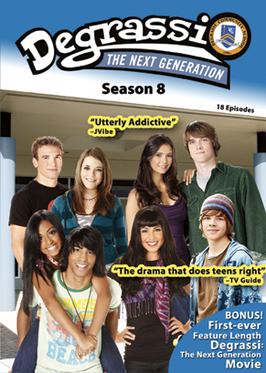Related Research Articles
A soap opera, daytime drama, or soap for short, is typically a long-running radio or television serial, frequently characterized by melodrama, ensemble casts, and sentimentality. The term "soap opera" originated from radio dramas originally being sponsored by soap manufacturers. The term was preceded by "horse opera", a derogatory term for low-budget Westerns.

The Global Television Network is a Canadian English-language terrestrial television network. It is currently Canada's second most-watched private terrestrial television network after CTV, and has fifteen owned-and-operated stations throughout the country. Global is owned by Corus Entertainment — the media holdings of JR Shaw and other members of his family.

Late Show with David Letterman is an American late-night talk show hosted by David Letterman on CBS, the first iteration of the Late Show franchise. The show debuted on August 30, 1993, and was produced by Letterman's production company, Worldwide Pants, and CBS Television Studios. The show's music director and leader of the house band, the CBS Orchestra, was Paul Shaffer. The head writer was Matt Roberts and the announcer was originally Bill Wendell, then Alan Kalter. In most U.S. markets the show aired from 11:35 p.m. to 12:37 a.m. Eastern and Pacific Time, and recorded Monday to Wednesdays at 4:30 p.m., and Thursdays at 3:30 p.m. and 6:00 p.m. Eastern Time. The second Thursday episode usually aired on Friday of that week.
Broadcast syndication is the practice of content owners leasing the right to broadcast their content to other television stations or radio stations, without having an official broadcast network to air it on. It is common in the United States where broadcast programming is scheduled by television networks with local independent affiliates. Syndication is less widespread in the rest of the world, as most countries have centralized networks or television stations without local affiliates. Shows can be syndicated internationally, although this is less common.
Open Mike with Mike Bullard was a Canadian late-night talk show which was broadcast live on the The Comedy Network 1997 to 2003 and was so successful it was picked up by the full CTV Television Network beginning in 1998. For a time it overtook The Tonight Show with Jay Leno and Late Show with David Letterman to become the highest rated late-night show among Canadian viewers. The show aired at 12:30 AM on CTV and was repeated the next day at 10 PM on the Comedy Network. It was considered the first successful Canadian attempt at the genre, following the previous failures of 90 Minutes Live and Friday Night! with Ralph Benmergui.

Michael Bullard was a Canadian stand-up comic and broadcaster. He was the host of two late-night talk shows, Open Mike with Mike Bullard on CTV from 1997 to 2003 and The Mike Bullard Show on Global from 2003 to 2004. He also hosted a midday radio show, Beyond the Mic with Mike Bullard from 2010 to 2016 on CFRB in Toronto.
The Eleventh Hour is a Canadian television drama series which aired weekly on CTV from 2002 to 2005.

Cold Case is an American police procedural crime drama television series. It ran on CBS from September 28, 2003, to May 2, 2010. The series revolved around a fictionalized Philadelphia Police Department division that specializes in investigating cold cases, usually homicides.

Blue Heelers is an Australian police drama series that was produced by Southern Star Group and ran for twelve years on the Seven Network, from 1994 to 2006. Although based around the policing of the town, the series generally depicted the everyday lives and relationships of the residents of Mount Thomas, a fictional small town in Victoria.

Dream Job is an American reality television show made by ESPN, which began on February 22, 2004. It was the network's second reality show, with two editions of Beg, Borrow & Deal having previously aired. However, this was the first reality show from a network to offer its winner an on-air place on one of its shows. The show was hosted by Stuart Scott.
McEnroe is an American television talk show hosted by tennis player John McEnroe that was broadcast on CNBC from July 7 to December 15, 2004. It was taped at CNBC's New Jersey studio, and tapings began at about 2 p.m. The show aired Monday through Thursday on the network. McEnroe's wife, Patty Smyth, sang the show's theme song. His sidekick was John Fugelsang.

Global Sunday was a Canadian news magazine television program which aired Sunday evenings on the Global Television Network. The program was launched in September 2001, with Charles Adler as host. Run separately from the rest of Global's news division, the program often reflected the political views of Global's founder, Israel Asper and the Asper family, and was designed to showcase a Western Canadian perspective on Canadian political affairs.

The One: Making a Music Star is an American reality television series that aired in July 2006 on ABC in the United States, and CBC Television in Canada. The show was hosted by George Stroumboulopoulos, the host of CBC's The Hour. It was advertised as being superior to American Idol and Rock Star with the twist that contestants "live together in a fully functioning music academy", with their actions documented similar to the Big Brother format.

The fourth season of Degrassi: The Next Generation commenced airing in Canada on 7 September 2004, concluded on 14 February 2005 and contains twenty-two episodes. Degrassi: The Next Generation is a Canadian serial teen drama television series. This season depicts the lives of a group of high school sophomores and juniors as they deal with some of the challenges and issues teenagers face such as bullying, dysfunctional families, school shootings, mental disorders, STDs, disabilities, gambling, homosexuality, and inappropriate student-teacher relationships.

The sixth season of the Canadian teen drama television series Degrassi: The Next Generation commenced airing in Canada on 28 November 2006, concluded on 14 May 2007 and contains nineteen episodes. This season depicts the lives of high school juniors, seniors and graduates as they deal with some of the challenges and issues young adults face such as imprisonment, online predators, burglary, substance abuse, stress, gambling addiction, financial difficulties, school rivalries, pregnancy scares and death. This is the first season in franchise history to feature college aged characters in prominent roles. Unlike the previous seasons, which took place over the course of an entire school year, season six only covers the fall semester of the school year, utilizing a semi-floating timeline. It also marks the first death of a main character in the series.
In 2001, the Vancouver/Victoria, British Columbia, television market saw a major shuffling of network affiliations, involving nearly all of the area's broadcast television stations. This was one of the largest single-market affiliation realignments in the history of North American television, and had a number of significant effects on television broadcasting across Canada and into the United States.

The eighth season of Degrassi: The Next Generation premiered in Canada on 5 October 2008, concluded on 30 August 2009, and consists of twenty-two episodes. Degrassi: The Next Generation is a Canadian serial teen drama television series. Although only one school year passed in the story timeline since season six, season eight is set in the fall semester of the year in which it aired. Writers have been able to use a semi-floating timeline, so that the issues depicted are modern for their viewers. This season depicts the lives of a group of high school freshmen, juniors, seniors, and graduates as they deal with some of the challenges and issues young adults face such as sex, sexism, sexual identity, financial difficulties, drug use, mental disorders, cyberbullying, child molestation, stress, hostage situations, racism, and psychological abuse. Thirteen actors are added to the ensemble cast, while fourteen cast members have either left the series or been dropped from the main cast to recurring roles. The season focuses heavily on the new generation of students at Degrassi Community School, although it included storylines about those who have graduated and gone on to university.
The Nightly Show with Larry Wilmore is an American late-night panel talk show hosted by Larry Wilmore that aired on Comedy Central from January 19, 2015, to August 18, 2016. The show was a spin-off of The Daily Show, which featured Wilmore as a recurring contributor. It aired Monday through Thursday at 11:30 PM (ET) following The Daily Show. It served as a replacement for The Colbert Report, which aired in the same time-slot from October 2005 to December 2014.
In 1995, Viacom and Chris-Craft Industries' United Television launched United Paramount Network (UPN) with Star Trek: Voyager as its flagship series, fulfilling Barry Diller's plan for a Paramount network from 25 years earlier. In 1999, Viacom bought out United Television's interests, and handed responsibility for the start-up network to the newly acquired CBS unit, which Viacom bought in 1999 – an ironic confluence of events as Paramount had once invested in CBS, and Viacom had once been the syndication arm of CBS as well. During this period the studio acquired some 30 television stations to support the UPN network as well acquiring and merging in the assets of Republic Pictures, Spelling Television and Viacom Television, almost doubling the size of the studio's television library.

The WB was an American broadcast television network operated as a joint venture between the Warner Bros. Entertainment division of Time Warner and the Tribune Broadcasting subsidiary of the Tribune Company. Launched on January 11, 1995, it was one of two networks developed by major film and television studios in late 1993—alongside the United Paramount Network —to compete with Fox and the longer established Big Three television networks.
References
- 1 2 Macdonald, Gayle (June 10, 2004). "Mike Bullard gets a makeover". Globe and Mail. Retrieved October 14, 2024.
- ↑ "Bullard premieres on Global next month". Broadcaster. October 2003.
- ↑ "UPDATE: Global axes Mike Bullard". Broadcaster. March 12, 2004.
- ↑ Ryan, Andrew (March 15, 2004). "Global cans Mike Bullard show with an e-mail". Globe and Mail.